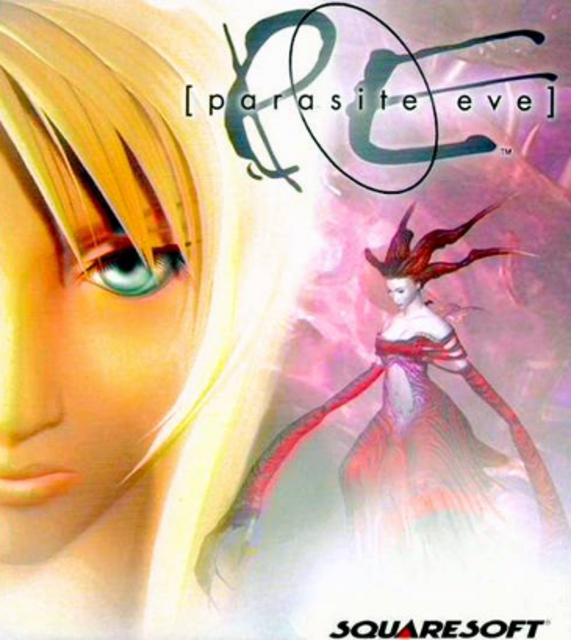Clever combat, a great female protagonist, and just a little jank
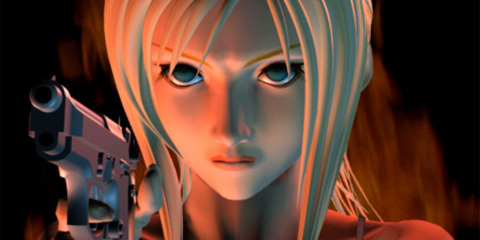
Parasite Eve takes place in New York City, circa-1997. NYPD officer Aya Brea decides to visit the opera on Christmas Eve, pulled there by some desire she can’t explain. Partway through the show, everyone in the theater begins to spontaneously combust--save for Aya and the lead actress. Aya chases after the mysterious woman, now calling herself Eve, and watches in terror as she changes before her eyes. Eve speaks of mitochondria, a part of human biology that allows her to morph and control humanity. She notes that Aya is special as well, her own mitochondria giving her special powers. Using these powers, and her trusty sidearm, Aya fights to stop Eve and save the city.
The story is a bit rough overall, for several reasons. None of the dialogue is voiced, and several scenes with just dialogue are eerily quiet; this isn’t uncommon for the era, but it feels strangely out-of-place here. Without the voices, the story seems oddly quiet and empty. The writing is a bit shaky as well, with loads of melodrama and lines bordering on mistranslation scattered throughout the game’s eight-to-ten hours. The story also feels very clearly Japanese in origin, thoughtful and reflective on humanity--just a little too stargazing for my tastes. The concepts of mitochondria and human evolution are creative ones, if a bit hard to believe, but there just isn’t a lot of substance to any of the characters or plot points. For these reasons, Parasite Eve’s story was easily the part of the game I cared least about, just serving as a small thread to follow until the end.
Aya is a pretty damn good character though, especially for the era. The fact that she is a woman is never mentioned, either explicitly or subtly, and she kicks a whole lot of ass. I’m sure that Aya was a great role model for the era, up there with greats like Lara Croft and April Ryan. The one complaint I have with her is that she suffers a bit of that mopiness that plagued the protagonists of nearly every Square Enix title from this era. It’s much more subdued, however, and doesn’t get in the way of an otherwise awesome character. The whole story is actually quite pro-female in nature, as the game mentions several times that the male mitochondria are weak and not able to evolve like female mitochondria. It’s a fascinating distinction to see in a late-90s game, let alone one from a Japanese company.
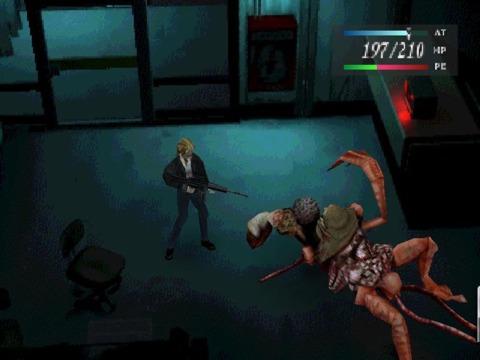
Until I started doing a bit of research for this review, I actually had no idea that Parasite Eve’s story is actually based on a novel of the same name written by a Japanese author. In fact, the past events that the characters in the game constantly reference are actually the events from this book, albeit a bit edited to fit into the story more neatly. I found this quite interesting, seeing as how very few games are actually based off books (Metro 2033 is the only one that comes to mind). While I don’t think it is necessary for understanding the story, I would very much like to eventually track down the original and read it for myself after seeing this game’s story..
Beating the game gives you the option of saving a clear game save and starting Ex Game mode. This is essentially New Game +, complete with your stats and items carrying over and a bonus dungeon filled with challenging monsters and new items. While I didn’t bother to go through the game a second time, I will note that bits of the story--including the “true” ending--are found at the end of this dungeon. For those players who wish to see every last bit of the game’s events (which the second game apparently follows, actually), it will probably be worth playing through this bonus dungeon.
Where I think Parasite Eve really shines is in the design of its combat. Instead of making yet another turn-based JRPG, Square Enix made something that mashes active combat and turn-based combat into something new. Any random encounter places you into a small arena that encompasses the size of the screen, with varying levels of camera zoom. You can walk around freely, dodging enemy attacks and positioning yourself for a counterattack. Once your turn gauge fills, you are able to queue up an attack (or item, weapon change, or escape) whenever you are ready.
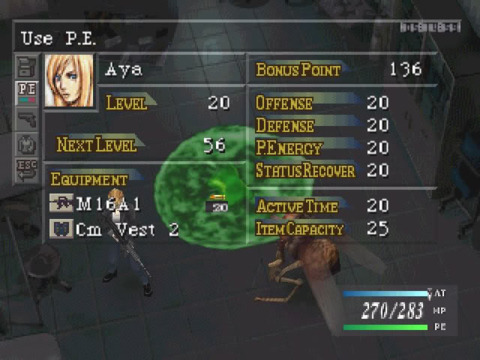
Aya can attack with any variety of weapons, most of them firearms. Each weapon type comes with different typical shot styles: pistols are quick to fire, machine guns spray bullets across the battlefield, shotguns fire in large cones, etc. There are a few melee weapons as well, but these are generally reserved for times when you are out of ammo, something I never had to deal with. Aya also has a variety of spells that unlock as she levels up. These range from heals of varying amounts to a haste buff that increases both the turn gauge speed and her movement speed, making it easier to dodge attacks. Using too many of these abilities in one battle, however, slows down the recovery of the gauge to the point of uselessness; this means you cannot just rely on it for heals in the longer battles.
I really enjoyed my time with the combat in Parasite Eve. There was just enough skill in dodging enemy attacks to make me feel rewarded for doing so, and the combat moves with a skillful pace that make battles fun. Boss fights are frequent and do a good job of mixing things up with tricky attack patterns. I only really had two complaints with the combat systems. First, Aya’s default movement speed is terrible, making it quite hard to dodge some of the faster enemies. Pair this with a smaller arena and sometimes enemies will get what feels like several free attacks on you. Second, I think the combat can get a little tedious, just in sheer amount of encounters. Once you learn how to fight a particular enemy type, they are pretty damn easy to fight again and again. Sadly, some of these enemy types are a bit bullet-spongey and pop up much too frequently. These are small complaints that only barely got in the way of my enjoyment with battling..
When you aren’t in combat, Parasite Eve resembles a Resident Evil game in design. You wander around large “dungeons,” looking for the way forward. Occasionally, you are tasked with finding keys or other special items in order to progress. It never gets puzzle-y, like the Resident Evil series, but it still feels like the best analog. One annoyance is that some of these areas can be tricky to navigate, with the fixed camera angles and low resolution hiding the way to progress. It can take a bit of poking around to figure out where to go at times.
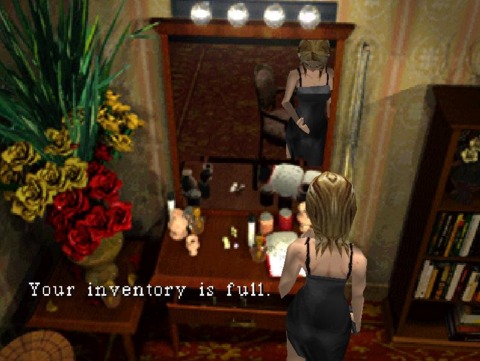
You can find chests scattered around with new weapons and armor, ammo, and medicine to help you fight through the various random encounters. It’s quite crucial to track these items down, as new weapons and armor make HUGE differences and constant encounters will eat voraciously into your medicine and ammo reserves. I liked that random encounters aren’t exactly random, as they always take place in the same locations but not every single time you walk through. All in all, Parasite Eve was a game I enjoyed exploring--every new hallway led to fun fights and tasty loot.
All these items, and a limited amount of spaces to store them in, makes inventory management a bit of a pain. You get TONS of items and can only dump them off in one discreet location, a place that can nearly always be visited but only with a bit of travel time and annoyance. Also, several key items that are only used once aren’t discarded automatically from your inventory after you use them. Strangely, some of the later key items DO automatically disappear from your inventory, a fact that seems rather inconsistent. Ammo is the one blissful exception, stacking infinitely and being shared between weapons, a very nice consideration on the part of the developer. The inventory amount does increase as you level up, finally settling at a reasonable number, but early going can be quite rough as you try to decide what to keep and what to toss.
Parasite Eve wouldn’t be an RPG without some stats to manage. Aya gains stats automatically as she levels, such as her base health pool and inventory spaces, without any input from the player. She does, however, accumulate bonus points from her fights. Bonus points are generated in greater quantities if you manage to finish a fight without taking damage or in a certain amount of time, incentivizing you to avoid playing sloppily. These bonus points can be used in a variety of ways, from increasing the inventory limit to actually buffing Aya’s various weapons and armor. This is a nice way to “fix” some of the issues you’re having with the game, boosting the things that you feel you need without wasting points on other things.
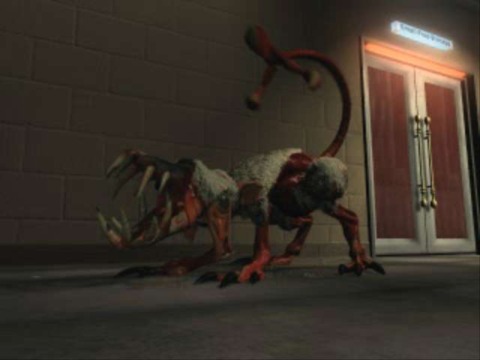
Special care should be taken with your guns and armor too. Equipment often comes with various helpful abilities, like the ability to take two actions in one turn (gun) or immunity to poison (armor). Equipment also comes with bonus stats, special +1s or +2s that are transferable (along with those passive abilities) with the use of tools. It’s actually quite important to move these bonus stats and abilities between gear as you obtain better stuff later on, as each point or ability can really make a difference in the endgame. Proper management of these stats is quite crucial for making the final bosses manageable. I think this is a smart system, one that lets you easily move to a new piece of gear by transferring all the bonus stats to it with no lost progress--something other RPGs could learn from.
While it may look just as rough as any Playstation game, Parasite Eve features some pretty amazing creativity in its CG. Some of the cutscenes feature some dated but still shockingly grotesque transformation scenes as creatures mutate into monsters. Furthermore, much of the imagery throughout the game can be pretty damn fucked up, actually: people melting into goo and even a creepy baby monster complete with realistic crying. I was impressed at how well this stuff still held up, unsettling me several times throughout the game. The music was done by famous composer Yoko Shimomura (most likely known for the Kingdom Hearts series), but I just didn’t enjoy it that much. It fit the scenes relatively well, but none of it is memorable enough that I would recognize it again.
Parasite Eve is a sharp, entertaining, and condensed JRPG. The story is silly but somewhat enjoyable in its over-the-top melodrama. Aya is a fantastically noteworthy character for the era. The combat is well-designed and has great potential with just a few refinements (which maybe the sequel brings?). I also love how it only took me around eight hours to finish, the perfect length for the systems in place to keep me going with minimal annoyance. It was shocking to see how well this game holds up, even for someone who had never played it before 2014. I highly recommend it for anyone looking for a different Square JRPG, something that isn’t afraid to try something new.
